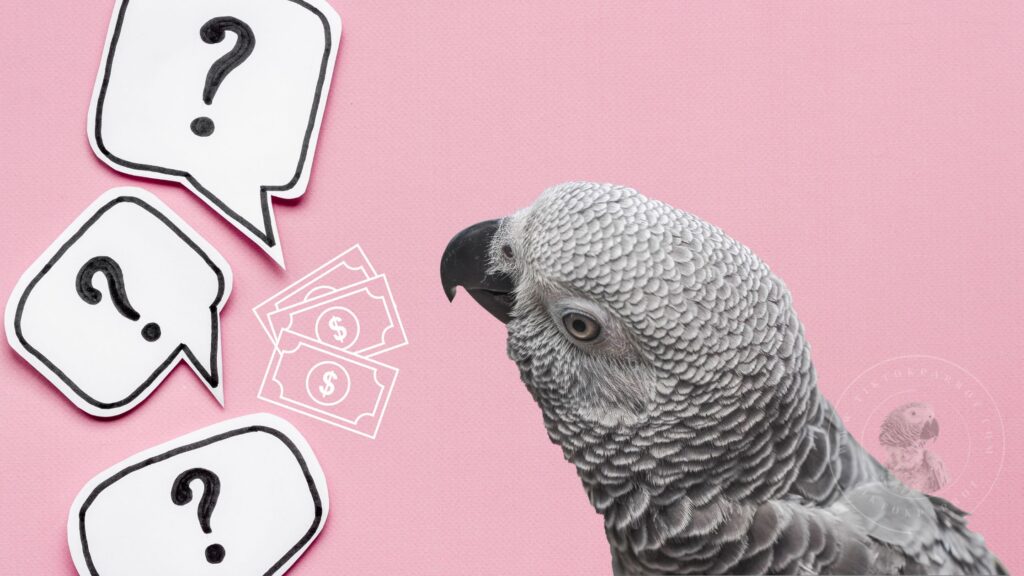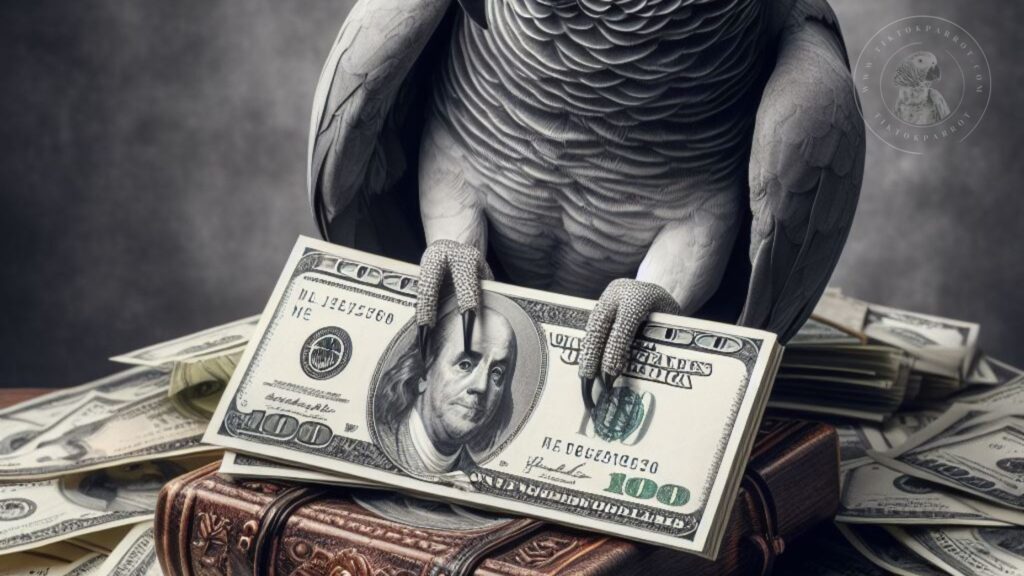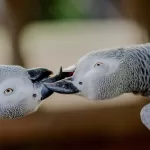African Grey parrots, renowned for their inquisitive nature and remarkable intelligence, are a popular choice for those seeking avian companionship. However, before welcoming one into your home, it’s essential to understand the financial implications involved. Let’s delve into the African Grey parrot price guide to grasp the expenses associated with these fascinating birds.
Discover the true cost of owning an African Grey parrot. Learn about prices, care tips, and more in this comprehensive guide. Get ready to feather your nest!

Thinking about getting an African Grey parrot? They’re super smart and curious birds, but they need a ton of attention and care. They’re bigger than your average pet parrot, measuring about 25 to 35 centimeters. Before you decide, let’s break down the costs:
How much do they cost? An African Grey can range from $1000 to $3500. The price varies a bit depending on the country you are buying from, the type: Timneh or Congo African Grey. Congos are more common. I have already written a blog post about African grey prices, I will mention the link in this blog post and you can check that out also for further information.
Factors affecting the price of an African Grey
The Importance of Appearance
The aesthetic appeal of an African Grey significantly influences its price. Birds with vibrant plumage and no physical imperfections command higher prices in the market. Unique colorations, such as a rare pink or reddish hue, can substantially elevate the bird’s value.
Genetic Quality and Testing
The genetic lineage of an African Grey plays a crucial role in determining its price. DNA testing is often conducted to ascertain the bird’s genetic purity, especially for potential breeders. Additionally, health screenings for diseases and genetic testing to prevent crossbreeding between different subspecies incur additional expenses.
Rare Attributes and Their Impact
Unusual yet desirable attributes, like distinctive colorations or exceptional vocal abilities, can significantly enhance an African Grey’s value. Birds with rare features fetch higher prices due to their uniqueness and desirability among enthusiasts.
What makes the price go up?
Looks matter! A healthy, good-looking bird without any weird marks or blemishes will cost more. If your parrot has unique features like a rare pinkish color, expect to pay extra. Also, genetics play a part. You might want DNA testing to check lineage or for diseases, which adds to the cost. And if you want to make sure your parrot isn’t a mix of Timneh and Congo, that’s another test.
Is age a factor in the price of an African Grey?
Age and Initial Care
The age of an African Grey influences both its price and care requirements. Baby parrots, still requiring hand-feeding and intensive care, are initially less expensive but entail additional expenses for nurturing. As they mature and transition to adult food, their price increases commensurately.
Cost Variances with Age
Older African Greys, having outgrown their infancy, are sturdier and better adapted to new environments. However, their prices may decrease as they age, with rescue shelters often offering older birds for adoption at reduced or nominal fees.
Considerations for Older African Greys
Adopting an older African Grey can be a rewarding experience, albeit with unique considerations. While older birds may come with lower upfront costs, prospective owners should factor in potential health issues and the bird’s adaptability to a new environment.
Does age matter?
Yep, it does. Baby African Greys are cheaper but need lots of care. Once they’re weaned and eating adult food, they become pricier. Older birds can be cheaper, especially those from rescue shelters. Male and female prices are pretty similar, and you can tell the difference by their tail feathers.
Factors Affecting African Grey Prices
Apart from the age, the cost of an African Grey can vary significantly depending on several factors. Primarily, geographic location plays a crucial role in determining prices. While they may be more affordable in their native Western Africa, prices soar in regions like the United States. Additionally, within countries, prices can fluctuate based on state regulations and availability.
Timing and Seasonality
Understanding the timing of your purchase is essential for securing a good deal on an African Grey. Breeding seasons often coincide with lower prices as breeders seek to sell their broods. Conversely, demand may surge before holidays, causing prices to rise temporarily.
Where and when to buy? Prices vary by location. They’re cheapest in Western Africa, where they’re from. In the US, prices are higher and vary by state. Make sure you buy from licensed breeders, especially since international trade is banned.
What about laws and stuff? Don’t buy wild-caught birds; it’s illegal. Stick to reputable breeders who are part of parrot associations. Check reviews online. Each place has its own rules for owning African Greys because they’re endangered.
Warning Signs When Purchasing
Avoiding potential scams or illegal trade requires vigilance. Warning signs include sellers unwilling to allow inspection of the bird, prices significantly deviating from the norm, and lack of documentation for genetic claims. Thorough research and scrutiny can safeguard against fraudulent transactions.
Watch out for red flags:
- Sellers who won’t let you see the bird first.
- Prices that seem way too high or low.
- Cheap birds might come from bad places, and super expensive ones might be scams.
What else do you need to buy?
Beyond the initial purchase, owners must budget for ongoing expenses. This includes investing in a suitable cage, toys, and perches to keep the parrot stimulated. Additionally, veterinary bills, food supplies, and cleaning materials constitute recurring costs that contribute to the overall investment in bird ownership.
Besides the bird, you’ll need a good size of cage ($300-$500), toys ($50-$100), and maybe a travel cage ($200). Vet bills and food are ongoing costs, so consider bird insurance. Don’t forget cleaning supplies for the cage!
What about time and energy? These birds need a lot of attention. They’re smart and need several hours of interaction daily. Cleaning and feeding take time, and they can be noisy. Training them takes effort too. Plus, they should bond with your whole family, not just you.
Owning an African Grey entails more than financial commitments. These intelligent birds demand considerable time and energy from their owners. Daily interactions, training sessions, and socialization are essential for ensuring the bird’s well-being and preventing behavioral issues.
Final thoughts:
While African Greys offer companionship and intellectual stimulation, prospective owners must weigh the financial and non-financial costs carefully. By selecting the right time and place for purchase, adhering to legal guidelines, and being vigilant during transactions, individuals can embark on a fulfilling journey with their feathered companions.
I would say African Greys are awesome pets, but they’re a big commitment. If you’re ready for the financial and time costs, they could be perfect for you. Just remember, they’re not a decision to take lightly!
FAQs (Frequently Asked Questions)
- Q: Are African Greys suitable for first-time bird owners?
- A: African Greys require experienced caretakers due to their complex needs and high level of intelligence.
- A: African Greys require experienced caretakers due to their complex needs and high level of intelligence.
- Q: Can I adopt an African Grey instead of purchasing one?
- A: Adoption is a commendable option and provides a home for birds in need. However, ensure proper research and preparation for the bird’s specific requirements.
- A: Adoption is a commendable option and provides a home for birds in need. However, ensure proper research and preparation for the bird’s specific requirements.
- Q: How can I ensure the health of my African Grey?
- A: Regular veterinary check-ups, a balanced diet, and a stimulating environment are key to maintaining your bird’s well-being.
- A: Regular veterinary check-ups, a balanced diet, and a stimulating environment are key to maintaining your bird’s well-being.
- Q: Are there any alternative species similar to African Greys?
- A: While no bird is quite like an African Grey, species like Amazons and Cockatoos share some traits and may be suitable alternatives for certain individuals.
- A: While no bird is quite like an African Grey, species like Amazons and Cockatoos share some traits and may be suitable alternatives for certain individuals.
- Q: What is the lifespan of an African Grey?
- A: With proper care, African Greys can live for several decades, with some reaching ages of over 50 years if well looked after.
- A: With proper care, African Greys can live for several decades, with some reaching ages of over 50 years if well looked after.
- Q: Are African Grey parrots good pets for beginners?
- A: While African Grey parrots are intelligent and engaging pets, their high level of attention and care requirements may pose challenges for novice bird owners.
- A: While African Grey parrots are intelligent and engaging pets, their high level of attention and care requirements may pose challenges for novice bird owners.
- Q: Do African Grey parrots require special dietary considerations?
- A: Yes, African Grey parrots need a balanced diet comprising fruits, vegetables, nuts, and fortified pellets to maintain their health and well-being.
- A: Yes, African Grey parrots need a balanced diet comprising fruits, vegetables, nuts, and fortified pellets to maintain their health and well-being.
- Q: Can African Grey parrots mimic human speech?
- A: Yes, African Grey parrots are renowned for their ability to mimic human speech and sounds, making them popular among bird enthusiasts.
- A: Yes, African Grey parrots are renowned for their ability to mimic human speech and sounds, making them popular among bird enthusiasts.
- Q: How can I ensure the well-being of my African Grey parrot?
- A: Providing a stimulating environment, regular veterinary check-ups, a balanced diet, and ample social interaction are key to ensuring the health and happiness of African Grey parrots.
If you found this blog helpful, It would be great if you could share it with your family and friends who might find it useful as well.
You might like to read these as well 🙂
African Grey Parrot Price & Owning Cost
Tips for Buying an African Grey Parrot
How to Rear a Young African Grey Parrot
African Grey Parrot Temperament
Signs of Illness in an African Grey parrot
How Much Attention Does An African Grey Need?
African Grey Parrot Male or Female? (Determine Gender of African Grey)
For more useful content about African grey parrots, you can subscribe my site with your email to get notification upon publishing a new blog, the subscribe box you can see on the right side of this page. Also if you get an alert on your web browser while browsing my site, allow it and that will also give you an alert whenever I publish a new blog. 🙂
Stay safe and much love!


Hey there! 🐾 Looking for top-notch pet supplies or anything on Amazon?
Support our site by shopping on Amazon through our this referral link, it will not cost you extra!
Your purchases on Amazon can help us continue providing valuable content.
Thank you for your support! 🛍️












